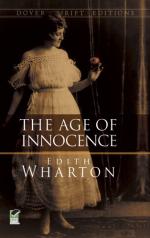|
|
The Age of Innocence Author/Context
Edith Jones Wharton was born in 1862 into a wealthy New York family. She grew up in a house with an amazing library of six or seven hundred volumes. The Jones's wanted their daughter to be well-read in the European tradition of Shakespeare, Milton, and other major novelists and poets. Edith Jones, like many young women of her social station, did not attend school. Instead, governesses came to her home. They taught her not only the social skills necessary for the women of her class, but also encouraged her love of learning and books. Edith began writing early in life. She wrote her first novel at the age of eleven. As she grew up, she continued to write, even though New York society did not consider it a suitable occupation for a woman.
When Edith was twenty-three years old, nearing the age when unmarried women of her class were in danger of becoming spinsters, she married Edward (Teddy) Wharton, a man twelve years her senior. They led fashionable lives in New York society, and frequently vacationed in Newport, Rhode Island and Europe. Wharton, though, was unhappy in her marriage. She fell in love at least twice with men nearer her own age. During these hard times, she increasingly turned to writing for comfort.
In 1891, Wharton published her first story. She went on to write over forty-two books, including the bestselling House of Mirth (1905), Ethan Frome (1911), and Summer (1917). By the time she divorced Teddy Wharton in 1913, she could financially support herself with the income from her books. She moved to Paris, and continued to write.
Wharton won the Pulitzer Prize in 1921 for The Age of Innocence. Like many of her novels, it is set in the changing world of Wharton's post-Civil War New York society. The uneasy mixing of two different societies - the old, wealthy families who had ruled New York society for decades with the newer wealth that had sprung up from the war - is the source of many of her novels. The Age of Innocence is a historical novel, set in the 1870s New York of Wharton's childhood.
Wharton has emerged as a major early twentieth-century American author. Her novels shed light on the complicated world of upper class society - a world that few novelists of her time could probe with such accuracy and authority. She exposes in her writing many of the social hypocrisies that shaped America's rapidly changing upper class. Her importance, however, goes far beyond the upper-class society that she helped expose to the reading public. Wharton has influenced the imaginations of many other writers - her contemporaries as well as those she continues to inspire today. The scholar Adelaide R. Tintner writes, "we need to remember that Wharton's creative imagination operated as well in a literary context with her contemporaries. . . Within her literary context should be considered those writers who, after her death, inherited her legacy. The most interesting part of that legacy for current writers seems to have been her life and her 'figure."'
Wharton died in Paris in 1937.
Bibliography
Bell, Millicent, ed. The Cambridge Companion to Wharton. Cambridge: Cambridge University Press, 1995.
Lawson, Richard. Edith Wharton. New York: Frederick Ungar, 1977.
Price, Alan. The End of the Age of Innocence: Edith Wharton and the First World War. New York: St. Martin's, 1996.
Tintner, Adelaide R. Edith Wharton in Context: Essays on Intertextuality. Tuscaloosa: University of Alabama Press, 1999.
Wharton, Edith. The Age of Innocence. Cambridge: Cambridge University Press, 1995.




